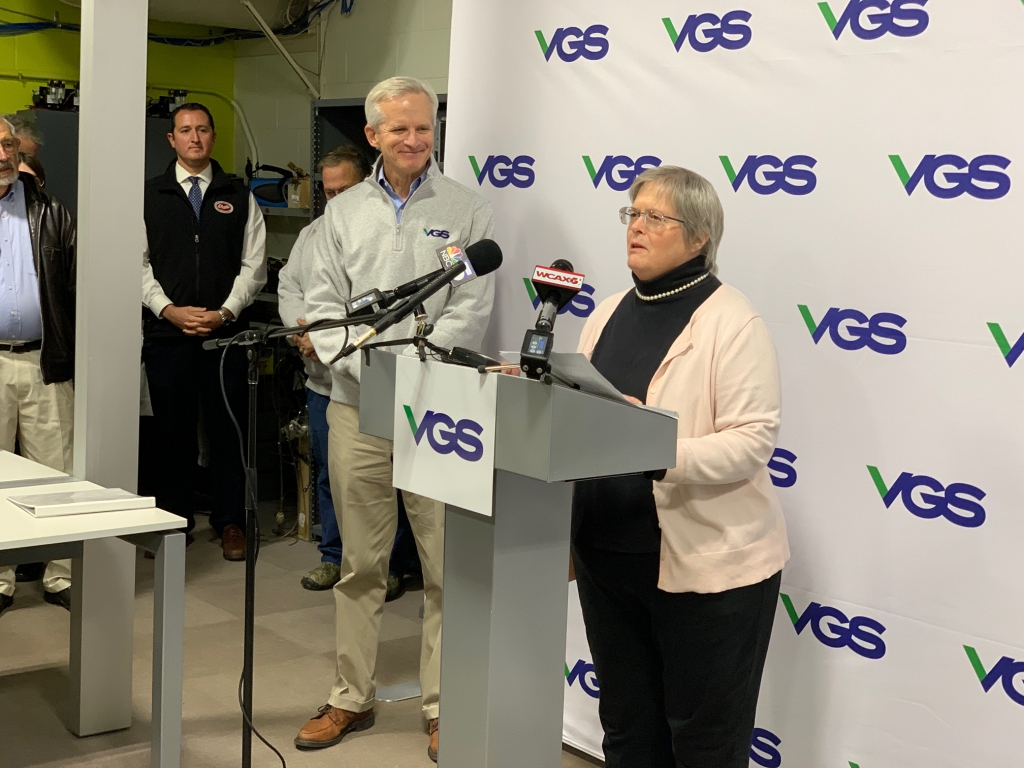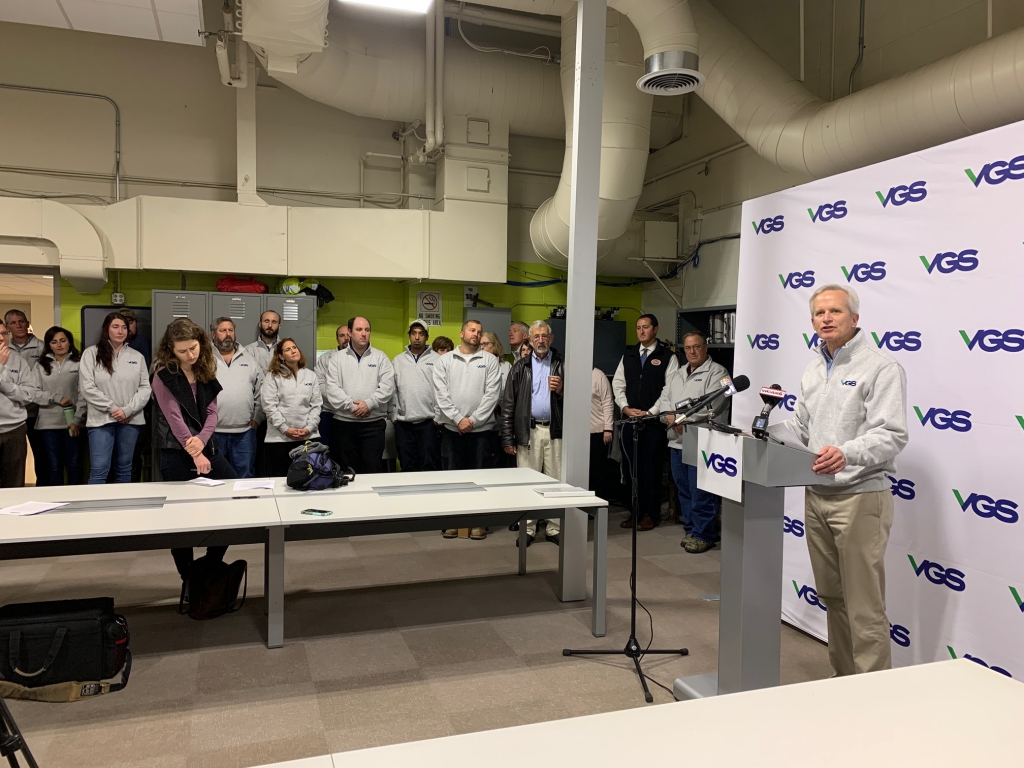Company unveils immediate plans to double energy efficiency savings and dramatically increase renewable natural gas for all customers
South Burlington, Vt. – VGS announced today an ambitious and comprehensive strategy to transform the company and eliminate greenhouse gas (GHG) emissions by 2050. The company outlined three key strategies to achieve the near-term goal of a 30% greenhouse gas reduction in customers’ homes and businesses by 2030: doubling energy efficiency savings with a $20 million upfront investment; significantly expanding renewable natural gas for customers; and strengthening partnerships to advance projects such as district energy in Burlington and Middlebury, and a net zero home pilot program.
“Today we put a stake in the ground: VGS stands with our customers and partners in the fight against global climate change,” said Don Rendall, President and CEO of VGS. “For more than 50 years, VGS has proudly served Franklin, Chittenden, and Addison counties with safe, reliable, and affordable natural gas. We’ve held energy bills low, helped support a robust local economy, switched customers to a cleaner fuel source, and kept customers safe and warm in their homes. That won’t change.”
“But how we do it will,” continued Rendall. “We propose to double energy efficiency savings and ramp up the role of renewable natural gas. We will help our customers make significant, measurable reductions in greenhouse gas emissions – 30% in the next 10 years – and put them and this company on course for zero greenhouse gas emissions by 2050.”
“The time to act is now,” Rendall said. “VGS will take steps today to transform from a traditional gas utility to a climate-forward energy company, reducing greenhouse gas emissions to zero while strengthening our commitment to safe, reliable, and affordable service for our customers.”
Double energy efficiency savings by 2025
The cornerstone strategy of the VGS vision is to double efficiency savings by 2025 with a $20 million upfront investment in its award-winning energy efficiency program. VGS will propose to triple home weatherizations – 3,350 homes weatherized by 2025 – focusing on low-to-middle income customers, as well as boost energy improvements for commercial & industrial customers.

As part of the efficiency expansion, VGS will help customers find the right low-cost, low-carbon solution for their energy needs, including non-gas alternatives such as electric cold climate heat pumps, advanced wood heat systems, and other options in support of the State’s 90% renewable by 2050 (90×50) plan.
“VGS has been a strong partner in supporting Vermonters with low and fixed incomes and we know they’ll continue to be,” said Jan Demers, Executive Director of the Champlain Valley Office of Economic Opportunity, a local non-profit committed to addressing fundamental issues of economic, social, and racial justice and working to help those in our community achieve economic independence. “Weatherization is an important way to reduce costs for Vermonters. We appreciate this balanced approach to make steady environmental progress while pledging ongoing support for those who need it most.”
The average residential customer that participates in VGS’ energy efficiency program saves about $200 per year – between 15-20% – on their energy bills.
“We have a home that, like many, was built with very little insulation,” said Nikki Jiraff, a customer who lives in Burlington with her family. “We called VGS for their free energy audit and they were amazing. We received wonderful information about how to make our home more comfortable and efficient, and the auditor even identified a safety issue that wasn’t on our radar. Thanks to the VGS incentive program, we now have a toasty warm home and will save money all year long on our utility bills. We feel so grateful and would definitely recommend this program to anyone!”
“VGS has been an excellent partner as we’ve worked together to help homes and businesses tighten up their air sealing and improve insulation, reducing heating bills and carbon emissions,” said Rebecca Foster, Director of Efficiency Vermont. “We’re excited to hear VGS announce its bold goal to eliminate greenhouse gas emissions by 2050, and the key role energy efficiency will play in achieving this goal. These steps will accelerate the state’s progress toward reducing carbon emissions while continuing to help Vermonters keep their buildings comfortable and affordable.”
Expand renewable natural gas for customers
VGS plans to increase its levels of renewable natural gas (RNG) so that 20% of its supply mix for retail customers will come from RNG by 2030. RNG is produced by capturing naturally occurring methane emitted from decomposing waste materials at places like farms, landfills, and wastewater treatment plants. VGS plans a steady increase in RNG in the coming years. The Company will propose to add approximately 2% RNG per year into its portfolio, which will allow VGS to build out its RNG supply chain and help keep rates affordable.

Last year, VGS became the first utility in the nation to offer customers a retail RNG option. Since no other program like it existed, VGS built the program from the bottom up, including the accounting, supply management, verifications, and gas quality procedures to introduce this product to the marketplace. Paul Ralston, owner and founder of Vermont Coffee Company in Middlebury, Vermont, was among the program’s first customers and is the first to roast coffee entirely on renewable energy.
“We are a small but growing company competing against giants on grocery store shelves,” Ralston shared. “Our company values are what sets us apart. We are fortunate to have a gas company that took risks and made investments to give us a reliable supply of fossil-free methane to power our coffee roasters.”
Further, to promote in-state development, VGS is working to increase the availability of locally sourced RNG. In August 2019, VGS joined its partners at Vanguard Renewables, Middlebury College, and the Goodrich Family Farm in Addison County, Vermont to break ground on the first local digester project that will turn farm and food waste into renewable natural gas in VGS’ pipeline. Vanguard Renewables and VGS recently received the American Biogas Council 2019 Up-and-Coming Biogas Project award for this project. RNG projects not only produce renewable energy, they can provide farmers a new income stream and help reduce run-off into Vermont waterways.
Partnering to speed development of pro-climate projects
VGS understands the value of great partners. We will achieve our climate goals by working closely with others to help customers significantly reduce their carbon footprint.
District Energy
A district energy system (“DES”) is a network of underground pipes used to provide thermal/heat energy to buildings more efficiently than individual systems. VGS is partnering to develop a DES in Middlebury, and also partnering with Burlington Electric Department and other stakeholders to develop a system in Burlington. These DES projects use renewable energy as their source.
Burlington DES would capture the waste heat generated with biomass at the McNeil Generating Station, providing a renewable heat source to large commercial customers. The Middlebury DES would capture the waste heat generated at an electric generator/digester, piping this heat to Agri-Mark’s dairy processing plant, providing a renewable heat source and a “closed-loop” waste management system for Cabot’s “World’s Best Cheddar.”
“Today’s announcement is exciting and welcome news for BED because VGS’ commitment to decarbonize complements the City of Burlington’s move to Net Zero Energy,” said Darren Springer, General Manager at Burlington Electric Department. “VGS has been an important and valued partner to BED through our joint work on weatherization and energy efficiency for our customers, the energyChamp Challenge, and efforts to move forward with district energy. Today’s announcement should be a call to action for all energy companies to consider how to adapt their business models to address the urgent climate challenge we face.”
Net Zero Home Pilot
In partnership with Burlington Electric, VGS will launch a Net Zero Home Pilot that will assist residents in achieving their greenhouse gas reduction goals.
The pilot is intended to help residents make their entire home energy footprint “net zero” – meaning all of their electric, thermal, and transportation energy is from renewable sources. The initiative will put the customer in the driver’s seat for designing least-cost, zero-carbon solutions that fit their energy needs.
The two utilities will provide customers with an action plan that can be tailored to fit a customer’s energy goals and budget to reduce their greenhouse gas emissions. Plans will include weatherization, equipment replacement, electrification options (e.g., cold climate heat pumps), renewable natural gas, and electric vehicle options.
RNG for off-grid customers
Last month, VGS partnered with NG Advantage (NGA) to announce a first-of-its-kind plan to offer renewable natural gas to industrial users and hospitals across the northeast through VGS’ pipeline and NGA’s virtual pipeline infrastructure. This unique partnership allows NGA’s customers here and across the Northeast to significantly reduce their carbon footprint with RNG, a benefit that until now has only been available to pipeline-connected users.
Benefits to the Environment, the Economy and our Community
Each of these initiatives provide an environmental, economic, and societal benefit to our communities. Taken together, the environmental benefit of these proposals is a 30% greenhouse gas reduction in customers’ homes and businesses by 2030 as compared to 2019. In 2030, that’s an annual reduction of over 187,000 metric tonnes of CO2e. In everyday terms, that is equivalent to about 40,000 passenger cars, over 15% of cars registered in Vermont.
Affordability is a foundational value at VGS. VGS customers have seen their heating costs drop steadily over the last 10 years. The average residential customer saves about $250 per year on heating compared to a decade ago.
Further, with a focus on weatherization for low-to-moderate and fixed income customers, VGS is determined to help those least able to make ends meet contribute to a clean energy economy. Additional investment in energy efficiency advances the Vermont economy through the support of clean energy jobs.
VGS has crafted a pro-climate plan that will remain affordable for customers. VGS estimates these clean energy measures will initially add about $3/month to the average residential customer’s heating bill in 2021, with similar modest annual increases through 2025, after which they are expected to level off. As part of its on-going commitment to customers, VGS will minimize cost impacts at every possible opportunity. VGS will work with regulators as these proposals advance.
“With our commitment today, we join energy trailblazers who have shined a bright light on the path ahead,” Rendall concluded. “For those who have not seen a role for VGS in Vermont’s clean energy future, we want you to know that VGS is all in. We share a conviction that we must reduce our greenhouse gas emissions and achieve a decarbonized, affordable energy future.”
For more on VGS’s vision, visit www.vgsvt.com
About VGS
VGS is a leader in energy efficiency and innovation, offering a clean, safe, affordable choice for over 54,000 homes, businesses, and institutions in Franklin, Chittenden and Addison counties. The company plays an important role in Vermont’s clean energy future by displacing higher-emitting fuels, offering renewable natural gas service, and delivering award-winning energy efficiency programs. VGS is leading the country in the development of local renewable energy generation and has targeted a 30% reduction in greenhouse gas emissions by 2030 and becoming Net Zero by 2050. For more information about Vermont Gas visit www.vgsvt.com
Media Contact
Dylan Giambatista
(802) 391-6475
dgiambatista@vermontgas.com
